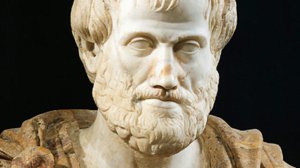
Aristotle
The following is a guest post from Toby Coe.
In Book Two of The Politics we witness the exciting clash of two conflicting political ideologies, Aristotle’s politics being primarily based on pragmatic concerns; whilst Plato’s state is founded on more idealised principles. In this essay we shall examine Aristotle’s critique of Plato’s utopia and whether these criticisms are valid, concluding that Aristotle’s criticisms of Plato are broadly successful, because they expose Plato’s conception of happiness as false.
Aristotle has two main complaints concerning Plato’s state:
1) The practice of wives and children being held in common is both impractical and wrong.
2) Communism among the guardians will be inimical to their happiness and bad for the state. Read the rest of this entry
